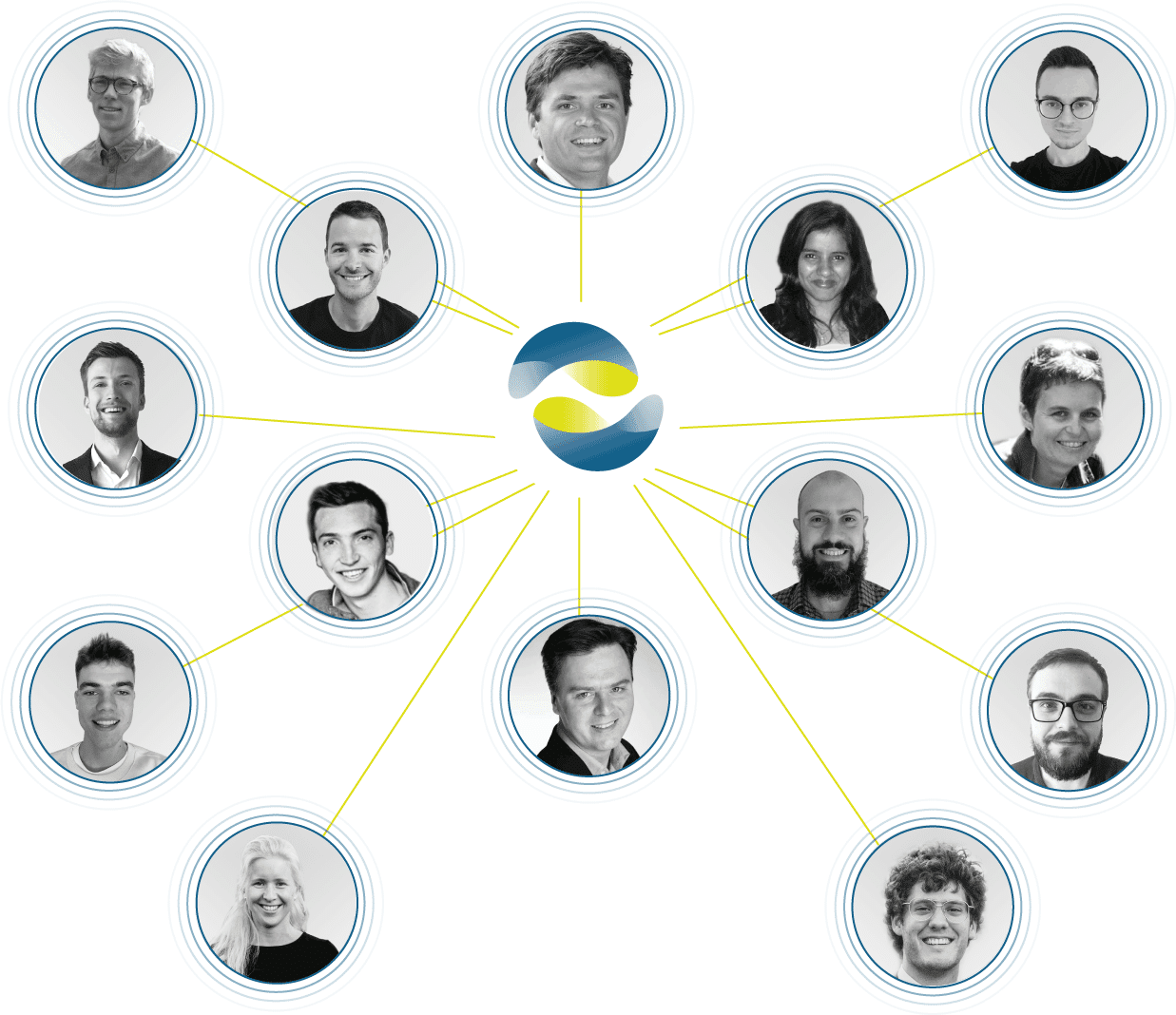An innovative look at renewable energy technologies
We cannot overlook that the energy landscape is shifting towards more sustainable sources of electricity. The vertically integrated monopolies are losing their relevance, which means that the time is now to connect decentralized sources with competitive markets.
Renewable energy production requires an innovative approach for the integration of decentralized sources and energy storage. Renewable energy aggregators are one such innovative business type.
How do renewable energy aggregators work? Acting as intermediaries, they combine sources and connect small-scale production and consumption with the wholesale market, usually only available to large enterprises and consumers. As a result, the aggregation of individual sources of electricity helps increase the industry’s competitiveness and introduce innovative technologies and tools.
Why did we decide to raise the issue of renewable energy and its aggregation? Orange Sputnik talked with the managing director and the Co-founder of the Yuso startup – Michel Verschuere, an expert in renewable energy technologies and a person with a ‘green heart.’ Today, you will learn how to launch a startup in the renewable energy industry and the benefits of aggregation technology for its participants and customers. We’re just at the beginning!
What is Yuso?

“Yuso is an aggregator of renewable energy,” Michel answered when asked to define the startup. After a few seconds of reflection, he clarified: “Enabling the renewable energy transition using flexible technologies like batteries. It’s what Yuso is about.”
After receiving Michel’s response, we thought about how innovative solutions affect the business landscape in the renewable energy industry.
Innovations have fundamentally changed the production, transmission, and consumption of energy and made these processes more flexible while enabling more efficient and economical use of renewable energy sources, empowering the next generation of energy consumers.
Of course, we became curious to know more about how Yuso’s idea appeared. But more on that later.
Identify the problem and find a solution
Like any other project, a startup starts with an idea. And, interestingly, this idea doesn’t have to be brilliant. It is sufficient to create a solution that wins against the existing analogues and solves the industry’s acute problem.
Before moving on to the story of the creation and launch of Yuso, we asked Michel about his background.
“I’m a scientist. After finishing my Ph.D. in physics, I worked at the wholesale market of the power, gas, and energy industry, where I was trading gas and power on the main connections in Western Europe,” stated our interviewee. “But actually, I have a ‘green heart,’ and I always wanted to contribute to the fight against climate change,” shared Michel his backstory and the reason why he started to work in the renewable energy industry.
“I have a ‘green heart,’ and I always wanted to contribute to the fight against climate change.”
Michel Verschuere
He continued: “In 2009, I left the industry to become an entrepreneur. I worked in the solar panels industry for a while. We imported materials and hardware to install solar panels on roofs of industries to enable them to produce their own energy. After three years, I sold this business and thought, ok, what’s next?”
Answering his question, Michel came to the point where the history of the company began and what problem prompted him to find an innovative and effective solution – to create an aggregator for renewable energy: “While I was working in the wholesale industry, I had noticed the fact that in Belgium, at least, you need to have a PPA (power purchasing agreement) for the excess production of electricity,” highlighted our interviewee the main problem.
As we already know, Michel found a solution to this problem, but here is what he said to us: “I’ve started with the idea why don’t we aggregate hundreds of small rooftops installations and all the power that they produce above their own needs? Why not buy it, aggregate it and bring it to the market?”
But how to implement the idea and create a product that is attractive to consumers and investors? Michel made us understand that a startup’s life starts with an idea but comes alive with the first steps and actions.
“With this business plan, I went to my former colleague, who is an electrical engineer himself and the Co-founder of Yuso today. We decided to make this idea a reality and started a company together,” he shared with us.
Finishing the discussion about the company’s background, Michel added some essential facts about the beginning of their journey: “In 2012 we launched the company and set all the IT up to become a strong player on the electricity market, as it is a very digitized market with a lot of data flowing around from all corners. In 2013 we started with the first tangible portfolio, and from that moment, we steadily grew,” claimed the Co-founder of Yuso.
A software development for a data-driven startup
After discussing the idea and background of the company’s launch, Orange Sputnik, as a worldwide software engineering service company and proven staffing provider, wondered how Yuso developed its software, whether they have an in-house team or work with remote programmers? Michel was happy to share with us the basic facts.
“In this market, you need quite a bit of development on the IT side,” said Michel and explained his statement. “Definitely, electricity is a data-driven market. In particular, you cannot see it, but you trade it on the market, and actually, the electricity that you trade arises as a difference between two intermediate values. It therefore requires a lot of IT development,” emphasized our interviewee. “Most of our infrastructure is on the cloud platform. Our IT department now consists of four developers, three are operating from abroad,” noticed the Co-founder of Yuso.
Clients, services and business model of Yuso
One day you get a revolutionary idea that you want to implement in the form of a startup. You put together a team, think over the implementation, look for … no, not money – a business model. Until you have it, no investor (well, almost none) will give you a dollar. A business model is a strategy to monetize your product/service. Without a clear understanding of customers and a business model, it is unlikely to take off.
In continuation of our interview, the next logical question that arose for us was Yuso’s clients, and of course, we asked Miсhel to tell us about what products and services their aggregator offers.
“Our fundamental market is in Belgium, Netherlands, and Switzerland,” our interviewee shared with us the geography of Yuso’s clients and emphasized the following. “Our business model is 100% B2B.”
Then Miсhel summarized their activity and singled out three types of services. “We have three products that we offer to our clients, in particular purchasing contracts for the power that is produced by solar panels on the rooftops of industries, sale of the electricity for the companies, flexibility services, and battery storage.” In the end, he added: “Solar electricity is ‘green,’ so we only use green power.”

The right business at the right time
Continuing the interview and discussion of the most important aspects of starting and developing a startup, we asked Michel why he believes that now is the perfect time to launch a renewable energy aggregator and why they chose this business model. Our interviewee shared with us his thoughts.
“I don’t think that there is the BEST time for anything,” stated the Co-founder of Yuso. “Everything needs a lot of courage and commitment, I would say. But it’s a GOOD time to do what we are doing, and for services that we provide. I think we started with the right business at the right time because many other countries copied the market model that Belgium maintained meanwhile,” noticed Michel Verschuere.
“I don’t think that there is the BEST time for anything.”
Michel Verschuere
Self-funding, credit, or a business angel?
After discussing an extensive background, business model, and clients, we moved on to one of the main aspects of launching and developing any startup – financing and finding investors.
“We both had some savings, and we put it into the initial amount to launch the company,” shared with us the Co-founder of Yuso. His words once again confirmed our belief that most entrepreneurs launch companies by investing their funds. But Yuso’s story, like that of other startups, is similar and different at the same time.
Michel continued: “But at some point, Yuso became so big that we couldn’t handle it with our own money anymore. So we had to look for external investments.” And after a few seconds, he also added a few more significant facts about the funding aspect: “We had a loan from the energy company in the very beginning. After one year, they told us they couldn’t any longer service us because of their shifting interests in electricity. After that, we got a business angel, which provided us with two rounds of funding.”

Despite the slowdown because of the Covid-19 coronavirus pandemic, people are still investing in renewable energy projects, in particular companies in Yuso’s target market.
“We both had some savings, and we put it into the initial amount to launch the company.”
Michel Verschuere
Team to be proud of
Hire the right people for the job, and you’ll never have a problem. Hire the wrong people, and it might ruin your best-laid plans.
After discussing the funding aspect, we moved on to the following equally important issue: the startup’s team. We asked Michel to tell us what he thinks makes his team the ones who can revolutionize the renewable energy industry.
“We have ten people, but we are planning to grow our team and add another 2-3 experts,” shared Michel with us their plans for scaling the team. “Apart from me, Bart – our second Co-founder and Sofie – our financial director, other people in our team are very young. Most of them just left university, and they are motivated about the improvement of the energy transition. The greatest thing is that they are eager to learn, practice, and implement the skills they get while working in Yuso,” stated our interviewee and emphasized the best qualities of his team and why it is so successful.

Michel also noted the importance of creating a great team spirit. “I think that’s the most important thing – when people are motivated, want to grow in their skills, and are fulfilled with what they are doing.”
You will likely agree that entrepreneurs rarely succeed alone. Behind the back of every successful leader is a team of motivated specialists who not only support the business but stimulate it and are ready to implement innovative solutions.
“I think that’s the most important thing – when people are motivated, want to grow in their skills, and are fulfilled with what they are doing.”
Michel Verschuere
Key ingredients for startup success
How is success expressed for a startup? Experienced entrepreneurs, business experts, consultants, investors, accelerators, and the founders themselves offer various definitions that cover everything from profitability metrics to customers’ valuation and market reach. What does the Co-founder of Yuso think about this aspect, and what are the priority metrics in evaluating their startup’s success?
“I am personally very much in favor of measuring the company’s success in terms of the quality of people you can hire,” emphasized Michel on the importance of qualified staff in their team. “But also in terms of financial results, like turnover, the number of customers. These metrics very much drive me,” he stated.
Michel Verschuere also made us understand that success lies not only in the financial aspect and an expert team but also in quickly solving critical challenges and competing on the best conditions. “In a sense, we deal with solar, which sometimes destabilizes the electricity grid, and if you don’t manage it correctly, it can become a recipe for disaster. So we are good at what we are doing, and we see that every day because we offer better service than our competitors.”

“We are good at what we are doing, and we see that every day because we offer better service than our competitors.”
Michel Verschuere
Why is growth crucial for a startup development?
The following fundamental aspect of startup development that we have discussed with Michel was growth – something that every tech startup craves, what investors and the market itself expect from it. Rapid growth is a sign of a great idea and business model. And without a doubt, it is easier for a growing startup to overcome the first problems on the road to success, such as the loss of customers or staff.
A startup’s success is impossible without its growth and scaling, which led us to the question of Yuso’s plans for the future. “I believe we will have more battery projects going up for several reasons,” stated Michel and continued with explaining his statement. “I think for us, to build an entire portfolio of batteries, and at the same time grow our turnover and volumes is a great plan for the next year. And that’s where I want us to be in one year.”
First customer = first step?
What is the crucial step for a startup launch? Most of our interviewees do not mention an idea, a search for investors, or even a product-market-fit, but attracting the first customers. We asked Michel how they found their first customer and what client strategy worked for their startup.
“It’s a long story, but basically, your database is everything in sales,” stated the Co-founder of Yuso. “So we started with collecting a good database. I was personally calling everyone and went for meetings and trying to convince them about our platform and service benefits. That’s how everything worked for us.”
Ask any entrepreneur about the most significant challenge he has ever faced, and you’ll get a prompt reply – winning and keeping customers.
What question should every entrepreneur answer?
What should you never forget when developing a startup? About the aspect such as risk! Good question: “What’s the downside to success?” If you can answer this question, you know what the worst-case scenario is and what you should always be prepared for when developing your business. What challenges might a startup in the renewable energy industry face? This is the answer we received from Michel.
“Well, electricity is still a very regulated market,” noticed the Co-founder of Yuso and highlighted the main issue that can become a significant obstacle to their company’s development. “The government can change regulations and the laws, which can make this business impossible, and that’s the biggest threat. Otherwise, I can’t say we have many other challenges on our way to success,” confidently stated our interviewee.
Who inspires the Co-founder of Yuso?
After discussing all the most exciting aspects of launching a startup and the activities of Yuso, we asked Miсhel several personal questions. One of the questions was about the inspiring executives he might follow. Like many tech startup co-founders, he singled out Elon Musk as “a courageous engineer and entrepreneur.” Still, he also added that “there are many others who have something to say and to offer to this world, and such people, of course, inspire and motivate me.”
Advice for young entrepreneurs
At the end of our interview, we asked our interviewee for some advice to young entrepreneurs. Michel happily shared some valuable insights with our audience.
“If we are talking about being an entrepreneur, always start something in the area of your knowledge and expertise,” he stressed the importance of knowing a particular area. “And the second thing – listen to experienced and successful entrepreneurs, learn from their experience and mistakes, and how did they manage to solve them. Because you can’t study entrepreneurship, no university will give you a degree in it. You can only learn it and earn it by doing it.”
“You can’t study entrepreneurship, no university will give you a degree in it. You can only learn it and earn it by doing it.”
Michel Verschuere
We would like to add…
Innovation has led to rapid cost reductions in critical renewable energy technologies, and aggregators have defined a new era in the renewable energy industry. We have already seen this in the example of our today’s interviewee – startup Yuso and their innovative renewable energy aggregator.
Today, thanks to innovative technologies, and in particular renewable energy aggregators, the energy industry as a whole opens up opportunities for new markets and services for decentralized energy sources.




